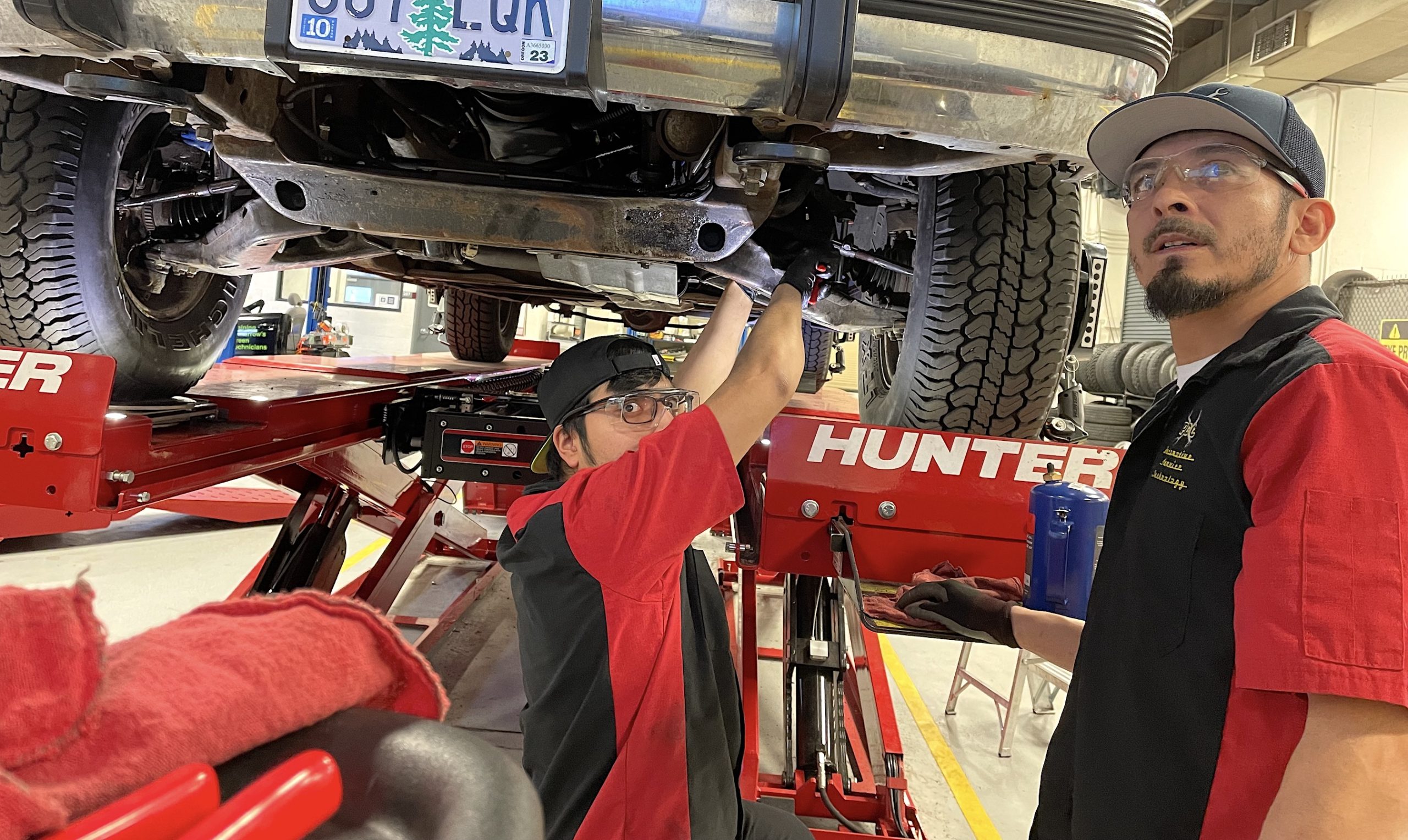Auto Service Technology Program Becomes Focus Of Companies To Address Worker Shortage (Photo) -04/03/23
SOUTHWEST PORTLAND, Ore. – Many trades industries are having critical worker shortages. If you’ve had to take your car in for a repair or scheduled maintenance, you know this is true for the automotive service industry too.
According to Market Source, the U.S. is facing a critical and ongoing shortage of auto technicians as more older technicians have retired and the entrance of younger workers has waned. It estimates through 2026, 16,500 shops will need 76,000 technicians just to keep up with demand. The Oregon Employment Department forecasts that the need for auto techs in the Portland area will grow 6.4% through 2027.
“Currently the industry is experiencing a severe shortage of experienced technicians,” said Russ Jones, department chair for PCC’s Automotive Service Technology Program, which is located at the Sylvania Campus in Southwest Portland. “Every shop I know is looking for at least one, if not more technicians. I have had manufacturer technician recruiters tell me they have a 10,000-technician shortage nationwide.”
PCC’s Automotive Service Technology Program, which enrolls between 50-60 students every year, is the local option for students to get trained quickly and find employment. The program trains them on cutting-edge equipment and automotive industry best practices with flexible class schedules. It has an industry advisory committee guiding curriculum and seven full time instructors teaching classes from 7 a.m. to noon every week day.
And, faculty and industry reps routinely debunk myths associated with the field like auto servicing work is beneath most people and is low-paying. Automotive service technicians work in clean and high-tech environments as they apply their expertise in solving vehicle electrical and mechanical problems.
“For years this was looked at as a dirty, low-paying industry, which is the opposite of what it really is,” said Jay Kuykendall, auto service instructor. He added that the field is becoming more high-tech and advanced.
“There are a lot of good paying technical jobs in the industry now,” he continued. “We have a lot of other industries that come to us and hire out of here because they are looking for students with the same skill set, knowledge of running the tools, troubleshooting abilities, and the electrical knowledge. They are happy to take our students with those skills and train them in their own particular equipment and systems.”
PCC is the largest educational institution in the state and is one of the largest employers in the Portland metro region. Without improved state investment in workforce training like auto service technology, skills building and essential wrap-around support services for students, PCC cannot provide economic mobility to Oregon’s underserved communities. It benefits everyone when the state supports Oregonians to attain degrees and better paying jobs.
Hillsboro's Angel Orosco, who is in his fourth term in the program, is one of those students who is benefiting from PCC’s training. Orosco said he is developing a great set of skills to someday become a master technician. He always had an interest in cars as a hobby and gravitated to PCC to expand his love of solving mechanical problems.
“There are so many things being put into cars that I had never thought of,” Orosco said. “You not only learn a lot of math, but there’s a lot of training on how to describe situations and car issues to customers, who may not be familiar with them. I really like this program.”
For more information on the Auto Service Technology Program, visit its webpage or call (971) 722-4130.
About Portland Community College: Portland Community College is the largest post-secondary institution in Oregon and provides training, degree and certificate completion, and lifelong learning to more than 50,000 full- and part-time students in Multnomah, Washington, Yamhill, Clackamas, and Columbia counties. PCC has four comprehensive campuses, 10 education centers or areas served, and approximately 200 community locations in the Portland metropolitan area. The PCC district encompasses a 1,500-square-mile area in northwest Oregon and offers two-year degrees, one-year certificate programs, short-term training, alternative education, pre-college courses and life-long learning.
Visit PCC news on the web at http://news.pcc.edu/
